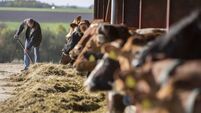€5,130 could be added to tax bill of self-employed farmer earning €60k if proposal adopted

The Tax Strategy Group has published its papers in advance of the forthcoming Budget.
The Tax Strategy Group (TSG) has the unenviable task of examining the existing tax system and presenting options on how the system can be tweaked to better meet the government's objectives and to present options to consider informing budgetary policies.
This week I take a look at the options presented around PRSI (Pay Related Social Insurance). The TSG papers outline how the Social Insurance Fund had been building up a bit of a nest egg over recent years.
The Social Insurance Fund is effectively the name given to the pot to which those liable to PRSI contribute and out of the same pot pension payments are made to those who qualify.
The system has a bit of a hand to mouth existence in that the PRSI contributions that you and I make are actually going toward paying current pensioners and those currently on welfare as opposed to some pigeon-holed savings pot unique to each contributor. This system works but the warning lights are on.
The demographics of Ireland’s populations suggests a significant increase in the number of persons entitled to claim pension benefits at retirement age by 2050, yet the number of active working people in Ireland at that time will be proportionately smaller meaning those who are within the PRSI net at that time will have a much harder time covering costs of providing income for pensioners at that time.
As a result, it will mean a long term strategy to reduce pensions, increase pension age, drive up PRSI levies or change the basis by which pensions are calculated.
None of these options is palatable. In simple terms, any and all of these options reduce your and mine likely future State pension benefits.
In fact, these options are woefully unpalatable when you consider that any extra PRSI that is taken off employers or employees, this year, next year and out in the medium term will simply go toward covering the deficit that has arisen in 2020 and 2021 as a result of payouts in the form of the Pandemic Unemployment Payment.
Maybe those of us lucky enough to retain our jobs during the pandemic should just suck it up and be grateful, however a large part of me is cynical and recalls that that uncomfortable feeling that those who work hardest pay the most.
The Department’s 2020 TSG Paper 20/04 discusses the social insurance contribution made by self-employed workers in the context of the range of benefits to which they have access and noted that the combination of employer and employee PRSI contributions greatly exceeds the PRSI contributions that are payable by self-employed persons.
PRSI contributions increase
That paper suggested that self-employed PRSI contributions should be increased incrementally to 12.55% to match that payable by employers by 2028.
For a self-employed farmer earning €60,000 – the change in PRSI basis would add €5,130 to his or her annual tax bill. The TSG paper points out clearly that the PRSI rates for employees and the self-employed are relatively low compared to our EU neighbours.
What the paper fails to recognise is that the self-employed people (including proprietary directors who pay PRSI at self-employed rates) are the one’s who drive the whole economy and are by definition the employers who employ everyone else other than those working in State or Semi-State jobs.
Raising the PRSI rate will mean an effective rate of income tax for self-employed persons at the top rate of tax to over 60%.
Rather than beating the goose that lays the golden egg, I personally would much rather see credits granted to employers who take on additional employees and those who have been long-term unemployed or previously claiming illness benefits and enhanced grants for employing people with disabilities.
The overall Social Insurance Fund pot will fill up by increasing the contributions to the fund through increased employment and increased self-employment as opposed to trying to derive higher PRSI contributions from those who are already contributing. All will be revealed on Tuesday next so tune in next week for coverage on the changes that affect farmers.



